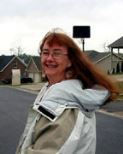Spring/Summer 2006, Volume 22.3
Poetry

Christine Delea
Mary Christine Delea is originally from Long Island, New York, and has lived all over the United States. Currently, she teaches in the Creative Writing Program in Eastern Kentucky University's Department of English and Theatre. Her first full-length book, The Skeleton Holding Up the Sky, is due out in January 2006 from Main Street Rag Press. She has had two chapbooks published: Ordinary Days in Ordinary Places (Pudding House Publications) and Moving the Language (Albireo Press). Her writing awards include two Pushcart Prize nominations, the 2001 Spoon River Poetry Review Editor's Prize, and various awards from state poetry societies, among others. Her poems have most recently appeared in A Gathering of the Tribes, Poetry East, Wisconsin Review, and Blue Mesa Review, as well as the anthology Sincerely Elvis. Visit her website at: https://www.christinedelea.com.
Sharing the Tornado's View
Let's give it an eye, placed right in the middle for an extra thrill:
the perfect view to our own destruction with a clear vantage point,
so unlike our own means of killing each other, which are always murky.
We will call it an eye because we are clever that way with language;
it separates us from the farm animals. Inside our homes, when the sky
turns still, we hide in dark basements so as not to feel the wind
snapping branches and car parts, slapping our houses like a jealous lover
in a rage, whipping dirt and beasts into one great shape on the prairie.
Our roofs extend to the heavens like gifts to the god we pray to for calm;
this god, too, we cannot see but we've given him a face.
We know the weather the way we know how our own tongues feel
and feel betrayed by pressures it exhibits, the borders we have planted
it refuses to obey. Inside our homes, we see the rain and hail as if it ran
from our eyes and feel that too-drunk-and-spinning feeling.
Let's give it more power to send chills from our corneas outward,
and let's pretend the lightning blazing through trees is our doing.
The Next New West—Summer, 2002
Doesn't a fire blow heat
to the bygone, char the before
of what existed even earlier?
A tree, an acre, a mountainside.
The past is made of ashes,
a slow rate of burn.
I can hear birds there.
The heat makes more meaning,
searing stones sound no alarms
to the animals, the grasses,
everything that is
because there is a was.
Then it glistens, although
there is no rain there.
I can still smell the smoke.
The woods. The stumps.
A blast like a star being born,
but it is only earth. And its past.
1.2 Miles Outside of Richmond
In some states, you don't need
to be far away from the city
to be far away from the city.
Our house, just a little in the country,
sits in fog, lights from our neighbors
shining through trees like stars.
I'd get lost trying to walk
in the dark to one of their places,
over fields and broken fences.
On nights like this we are alone,
on nights with fog we become
our own planet, silent and dim,
as if waiting to be discovered,
but content to watch out
our windows as the native life,
looking alien now, darts
around in the Kentucky haze.
